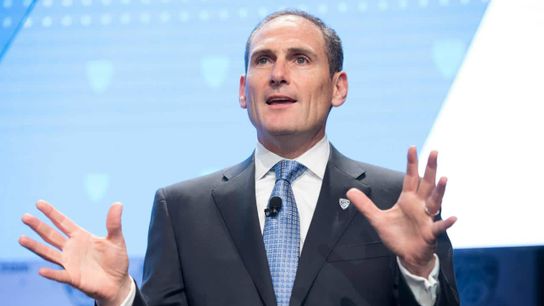The NCAA Tournament is the biggest event on the NCAA calendar. (Notice I said NCAA, not college sports. The NCAA has no formal involvement in the College Football Playoff.) As such, it's the height of #hotsportstakes from think piece authors that don't know the difference between DePaul and DePauw.
Pac-12 commissioner Larry Scott (formerly head of the Women's Tennis Association) and Big East commissioner Val Ackerman (formerly head of the WNBA) have responded with a think piece of their own in a jointly written op-ed for CNN. I'm not going to post the entire thing here, but I will post what I believe to be the college sports establishment's strongest argument against those that would see the entire enterprise gutted.
At a time when student debt is a major national issue, the men's and women's basketball players in our conferences don't have to worry about oppressive financial obligations when they leave school.
They go to college on full scholarships, and when they graduate, most graduate debt-free. They receive cost of attendance benefits, meaning their day-to-day needs, such as food, housing, clothing, gas, and trips home, are covered. They also get high quality medical care, academic support and quality travel experiences, in some cases globally. By some measures, these students receive more in benefits than the average American makes in a year in income.
In fact, the 170,000 athletes who play Division I sports are the beneficiaries of the nation's second largest college financial aid program, second only to the GI Bill. It's privately funded, paid for largely by TV contracts that allow supporters from around the country to follow teams from the schools they love. We refer to the scholarships these students receive when they're accepted to the colleges of their choice.
Importantly, many students who play sports are the first in their families to attend college, in large part thanks to the scholarships they receive. And if history is any guide, 67% of all Division I athletes will go on to become college graduates, a slightly higher graduation rate than that of their fellow students who do not play on NCAA sports teams.
These athletes also receive something even more important: they're taught how to be successful in college and in life.
In recent years, however, critics of college sports have alleged that these students are exploited. The students should get a salary, the critics say, because their schools generate revenues from the TV contracts that carry certain college games.
Our critics see college sports as professional sports. It's true that some men's college basketball players play for only a year or two, and then go pro. Critics want people to think these athletes are the rule, not the exception.
But they are the exception, not the rule.
Of the 1,210 students who played Division I men's basketball in 2013 (the latest year data is available), only 3.9% were drafted into the National Basketball Association.
The overwhelming majority of college students who play a sport know that college will be the last time they suit up and play competitively a game they've enjoyed since they were kids. They recognize that college is ultimately about getting a degree and getting ready for life long after their playing days are over.
They're not exploited. They're educated.
Whether you agree or disagree, I'd encourage you to read the piece and consider its arguments.
